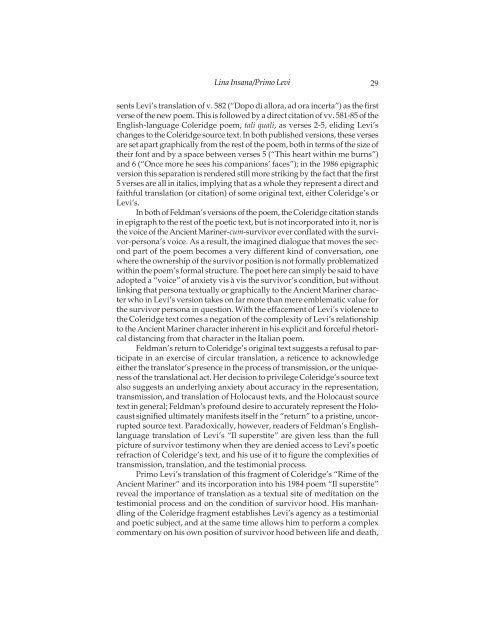Journal of Italian Translation
Journal of Italian Translation
Journal of Italian Translation
You also want an ePaper? Increase the reach of your titles
YUMPU automatically turns print PDFs into web optimized ePapers that Google loves.
Lina Insana/Primo Levi<br />
sents Levi’s translation <strong>of</strong> v. 582 (“Dopo di allora, ad ora incerta”) as the first<br />
verse <strong>of</strong> the new poem. This is followed by a direct citation <strong>of</strong> vv. 581-85 <strong>of</strong> the<br />
English-language Coleridge poem, tali quali, as verses 2-5, eliding Levi’s<br />
changes to the Coleridge source text. In both published versions, these verses<br />
are set apart graphically from the rest <strong>of</strong> the poem, both in terms <strong>of</strong> the size <strong>of</strong><br />
their font and by a space between verses 5 (“This heart within me burns”)<br />
and 6 (“Once more he sees his companions’ faces”); in the 1986 epigraphic<br />
version this separation is rendered still more striking by the fact that the first<br />
5 verses are all in italics, implying that as a whole they represent a direct and<br />
faithful translation (or citation) <strong>of</strong> some original text, either Coleridge’s or<br />
Levi’s.<br />
In both <strong>of</strong> Feldman’s versions <strong>of</strong> the poem, the Coleridge citation stands<br />
in epigraph to the rest <strong>of</strong> the poetic text, but is not incorporated into it, nor is<br />
the voice <strong>of</strong> the Ancient Mariner-cum-survivor ever conflated with the survivor-persona’s<br />
voice. As a result, the imagined dialogue that moves the second<br />
part <strong>of</strong> the poem becomes a very different kind <strong>of</strong> conversation, one<br />
where the ownership <strong>of</strong> the survivor position is not formally problematized<br />
within the poem’s formal structure. The poet here can simply be said to have<br />
adopted a “voice” <strong>of</strong> anxiety vis à vis the survivor’s condition, but without<br />
linking that persona textually or graphically to the Ancient Mariner character<br />
who in Levi’s version takes on far more than mere emblematic value for<br />
the survivor persona in question. With the effacement <strong>of</strong> Levi’s violence to<br />
the Coleridge text comes a negation <strong>of</strong> the complexity <strong>of</strong> Levi’s relationship<br />
to the Ancient Mariner character inherent in his explicit and forceful rhetorical<br />
distancing from that character in the <strong>Italian</strong> poem.<br />
Feldman’s return to Coleridge’s original text suggests a refusal to participate<br />
in an exercise <strong>of</strong> circular translation, a reticence to acknowledge<br />
either the translator’s presence in the process <strong>of</strong> transmission, or the uniqueness<br />
<strong>of</strong> the translational act. Her decision to privilege Coleridge’s source text<br />
also suggests an underlying anxiety about accuracy in the representation,<br />
transmission, and translation <strong>of</strong> Holocaust texts, and the Holocaust source<br />
text in general; Feldman’s pr<strong>of</strong>ound desire to accurately represent the Holocaust<br />
signified ultimately manifests itself in the “return” to a pristine, uncorrupted<br />
source text. Paradoxically, however, readers <strong>of</strong> Feldman’s Englishlanguage<br />
translation <strong>of</strong> Levi’s “Il superstite” are given less than the full<br />
picture <strong>of</strong> survivor testimony when they are denied access to Levi’s poetic<br />
refraction <strong>of</strong> Coleridge’s text, and his use <strong>of</strong> it to figure the complexities <strong>of</strong><br />
transmission, translation, and the testimonial process.<br />
Primo Levi’s translation <strong>of</strong> this fragment <strong>of</strong> Coleridge’s “Rime <strong>of</strong> the<br />
Ancient Mariner” and its incorporation into his 1984 poem “Il superstite”<br />
reveal the importance <strong>of</strong> translation as a textual site <strong>of</strong> meditation on the<br />
testimonial process and on the condition <strong>of</strong> survivor hood. His manhandling<br />
<strong>of</strong> the Coleridge fragment establishes Levi’s agency as a testimonial<br />
and poetic subject, and at the same time allows him to perform a complex<br />
commentary on his own position <strong>of</strong> survivor hood between life and death,<br />
29
















